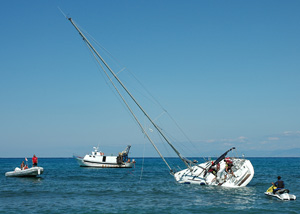Decoding The Insurance Jargon
Mission Impossible?
Maybe not impossible... though understanding all the insurance jargon out there can surely be challenging at times. This section will explain the most common travel definitions in general terms and in as plain language as possible - which is not always easy!

This list can not be conclusive and is only a guideline. Some policies might have different definitions but this list should give you the general idea.
Every insurance provider should provide a clear glossary of terms used in its policies. Read them carefully, they can vary greatly between insurance providers and it is important that you both have the same understanding of every word before you buy your insurance policy.
Your Insurance Jargon Guide
Accident - Commonly defined as an unexpected, unintended, unforeseen event causing injury. The accident must happen while you are on your trip to be covered under a policy
Act Of God - Legal term used for events outside of human control, such as natural disasters, for which no one can be held responsible
Beneficiary - The named person who will receive the proceeds of your insurance policy in the event of your death
Benefits - The amount that an insurance provider may pay you under the terms of your policy
Cancel For Any Reason - This insurance jargon is an optional benefit that empowers travelers to cancel trips for any reason including sudden unemployment, schedule conflicts, even bad weather, up to X number of days prior to departure
Carrier - Is commonly defined as an aircraft, vehicle, train, vessel or other public transport operated under a license for the purposes of transporting passengers (this definition may exclude taxis)
Chronic - Persistent and lasting health condition. Chronic pain does not have to be constant pain, in many situations it has a pattern of relapse and remission
Close Relative - Commonly defined as your spouse, child, parent, grandparent, brother, sister, parent-in-law, son and daughter-in-law, grandchild or fiancé, who is resident in your country of residence
Compulsory Excess - This is the first part of any claim that you would be responsible for paying and you have no choice regarding the amount. The amount is set by your insurance provider and this amount will need to be paid along with any voluntary excess you may have chosen
Country Of Residence - The country where you normally live in
Dependant - Is commonly defined as your children or grandchildren not in full time employment who are under the age of 21 and travelling with you on the journey
Domestic Trip - Travel within your country of residenceEpidemic - Commonly defined as a sudden development and rapid spreading of a contagious disease in a region where it developed in a simply endemic state or within a previously unscathed community
Excess - The amount of any claim that you must pay before the insurance provider starts paying. Each individual part of your policy will have a specific excess value, e.g. different excess in the case of medical expenses, death, theft, etc. There are two types of excess, compulsory and voluntary excess
Excess waiver - You may be able to pay extra amount on your policy to waive the excess
Exclusions - Insurance jargon for the expenses that an insurance provider absolutely will not pay for, e.g. expenses due to use of illegal drugs. All exclusions should be stated clearly in your policy
Expenses - These are the expenses that an insurance provider will consider for payment for example medical expenses due to contracting food poisoning
Hazardous Activity - Insurance jargon for any activity which the insurer believes to have a high level of risk associated with it, could be skydiving or scuba-diving. Any hazardous activities covered by your policy should be clearly stated, those that are not stated are excluded so read this section carefully
Indemnity - Insurance jargon for payment against losses designed to return you to your original financial position before the loss, or to put it simple this is the technical term for an insurance pay out
Injury - Is commonly defined as a bodily injury caused solely and directly by violent, accidental and visible means, during your period of cover and which does not result from any illness, sickness or disease
Intrinsic Value - Insurance jargon for the actual cash value of the item at the time of loss or damage including appropriate deductions for wear and tear
Journey - The time from when you leave your home to go directly to the place you depart from on your travels and ends when you return back to your home
Luggage And Personal Effects - Is commonly defined as any personal items owned by you and that you take with you, or buy, on your journey and which are designed to be worn or carried about with you. This includes items of clothing, personal jewelry, cameras, video equipment, personal computers, electrical devices and portable equipment
Negligence - The omission to do something which a reasonable man guided by those considerations which ordinarily regulate the conduct of human affairs would do, or doing something which a prudent and reasonable man would not do... or doing or not doing something that any reasonable person would do or not do
Overseas - Commonly defined as any country other than your country of residence
Pandemic - Form of an epidemic that extends throughout an entire continent, even the entire human population
Personal Money And Documents - This term tends to include the following: passport, travel tickets, foreign currency, travelers cheques, petrol coupons and credit vouchers, cheques, postal and money orders, driving license, bank notes and coins, being carried by you or whilst in a safety deposit box or locked safe
Policy - Insurance jargon for a document detailing the terms and conditions applicable to an insurance contract and constituting legal evidence of the agreement to insure
Policy Holder - The person in whose name the policy is issued
Pre-existing Medical Condition - Is defined as a health problem that existed already before you applied for the insurance policy, i.e. any condition for which an individual received care, treatment or medical advice before coverage comes into effect. Cancer, diabetes, pregnancy and heart conditions are examples of pre-existing medical conditions which can affect the cost or eligibility of coverage
Premium - Insurance jargon for the cost of your insurance cover
Primary Coverage - Provides coverage without any reference to any other insurance plans
Public Place - Any place that the public has access to, including but not limited to planes, trains, cruise ships, taxis, buses, air or bus terminals, stations, wharves, streets, museums, galleries, hotels, hotel foyers and grounds, beaches, restaurants, private car parks, public toilets and general access areas
Relative - Commonly means you or your travelling companion's spouse, de facto partner, parent, parent-in-law, daughter, son, daughter-in-law, son-in-law, brother, sister, brother-in-law, sister-in-law, grandchild, grandparent, step-parent, step-son, step-daughter, fiancé or fiancée, or guardian
Secondary Coverage - Provides only for those expenses not covered by a primary insurance plan, you must hold a primary insurance plan first
Sickness - Is commonly defined as a medical condition, not being an injury, which first occurs during the period of your cover
Third Party - In insurance terminology the first party is the insurer and the second party is the insured and the third party is the person claiming against the insured person (the second party)
Third Party Liability - Liability of the insured to persons who are not parties to the contract of insurance and are not employees of the insured
Travelling Companion - Commonly defined as a person with whom you have made arrangements to travel with you for at least 75% of your journey before you entered into your policy
Unforeseen - Insurance jargon for something that was not anticipated or expected and occurring after the effective starting date of the policy
Unsupervised - Leaving your luggage and personal effects with a person you did not know prior to commencing your journey. Also leaving it in a position where it could reasonably be taken without your knowledge or leaving it at such a distance from you that you are unable to prevent it from being taken
Voluntary excess - This is added to any compulsory excess set by your insurance provider and you can choose the amount of your voluntary excess. Choosing to increase the excess can lower you premium but be careful - this can be false economy if in the event of claim you cannot afford to pay the excess. Remember the voluntary excess would need to be paid on top of any compulsory excess already on your policy
There are more insurance jargon out there but this should give you good idea what to look out for when buying your Insurance Policy.


